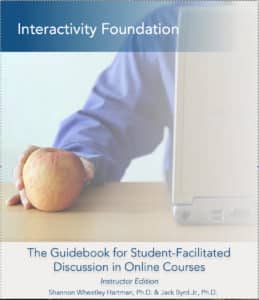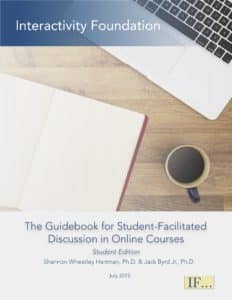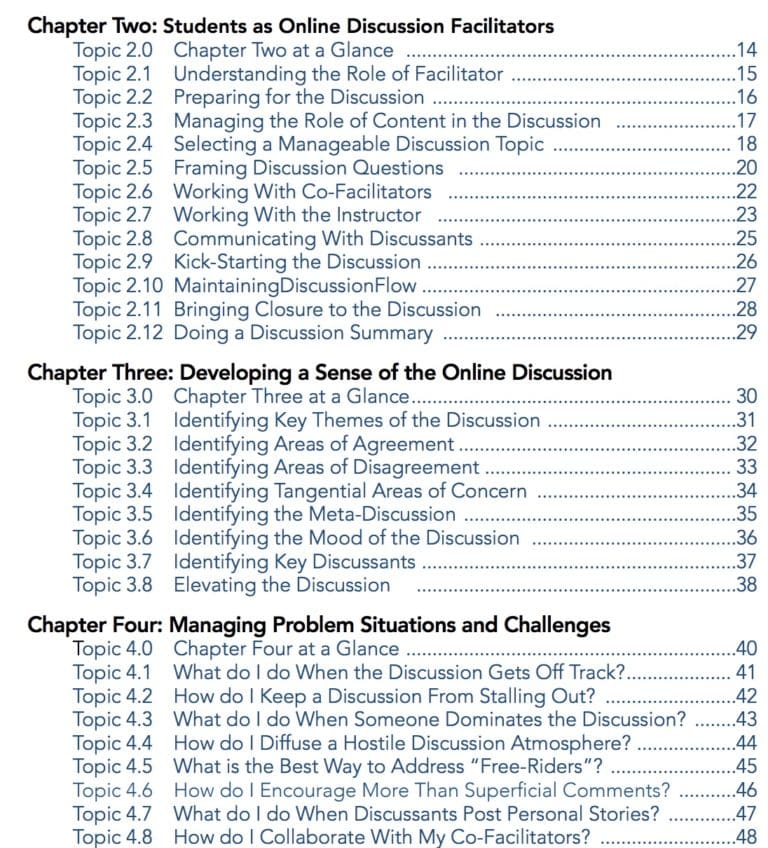 Are you teaching online? How are your online discussions going? Would you like your students to be more engaged and even take ownership of these discussions? We have resources for you.
Are you teaching online? How are your online discussions going? Would you like your students to be more engaged and even take ownership of these discussions? We have resources for you.
Online discussions are challenging. They were challenging even before the abrupt switch to online instruction, and they are particularly difficult now as students and faculty try to manage the anxiety, insecurity, and technological needs related to teaching during a global pandemic.
First, you are not alone, and this semester does not have to be the best online course you have ever taught. You are teaching during a crisis. This is triage teaching; it’s not the ideal. So keep it simple and be forgiving (not just of students but also of yourself).
Second, this is an opportunity to turn over some power as the course instructor and share authority. It’s an opportunity to try something new. We all talk about student-centered classrooms, but how about student-empowered classrooms?
I started incorporating student-facilitation in my classrooms about ten years ago and I have never stopped. It does take some work upfront, but then it frees up the instructor to really observe and analyze how students engage with one another. As some of our colleagues who use this online discussion approach have commented:
“The quality and quantity of students’ discussion online was categorically greater than in any previous course I have taught with an online component. What evolved in this course was, in fact, discussion rather than an exchange of unrelated posts. “
“I have been teaching online courses for several years, and I have long felt the weight of having to drive discussion and sometimes to ‘chase’ students to get them to participate, but I didn’t feel that way at all this summer. I wouldn’t say that I had less work to do, but my work was different; rather than me feeling responsible for all aspects of the discussion, I could observe my students, evaluate them, and then reflect on their work and their progress.”
“…the student-facilitated discussion boards offer additional benefits. The students must take a proactive, not reactive approach to the material and must lead the discussions. It is well-documented in teaching research that students who see themselves as ‘knowledge-producers’ are more engaged with the course material than as merely consumers—their typical role. Students also learn the value of a good question; Socrates would be pleased.”
So what is this approach and how do you incorporate it into your class?
The approach is a 3-part process: 1) pre-discussion, 2) discussion, and 3) post-discussion. In The Guidebook for Student-Facilitated Online Discussion (Instructor Edition), we walk you through setting up all 3 components. However, you may not have time for this full process right now. You are just trying to get through the semester with your sanity, right? Keep it simple, right? So, just try this shortened version:
Step One: Create a small group discussion environment. Ideally 8-10 students per group. Use the break-out room function in Zoom or create group discussion forums on asynchronous platforms (like text-based discussion boards in Canvas or Blackboard).
Step Two: Create a co-facilitation schedule for students. Each week a team of students (2-3) are responsible for leading the discussion. Share discussion guidelines and expectations with students. Sample templates for these guidelines are provided in the instructor edition of The Student-Facilitated Online Discussion Guide. The Student Facilitation Workbook is also a great resource for students preparing to facilitate.
Step Three: Allow the discussions to unfold each week. Observe and reflect. Intervene only when necessary.
 Step Four: Debrief with the student facilitators. Offer feedback to student facilitators and to the class. Sample rubrics are in the instructor edition of The Student-Facilitated Online Discussion Guide. Review facilitator reflections. Please note that detailed instructions for “how to write a facilitation reflection” are located in the student edition of The Student-Facilitated Online Discussion Guide.
Step Four: Debrief with the student facilitators. Offer feedback to student facilitators and to the class. Sample rubrics are in the instructor edition of The Student-Facilitated Online Discussion Guide. Review facilitator reflections. Please note that detailed instructions for “how to write a facilitation reflection” are located in the student edition of The Student-Facilitated Online Discussion Guide.
Step Five: Learn from the perspectives and insights of your students. Reflect on the skills they are developing through facilitating their own online discussions. Share with us your insights!
This may seem like a lot, but I have found that students rise to the challenge and prefer to be co-creators of knowledge rather than passive recipients. You may be surprised by the topics that they choose to discuss and the level of seriousness in which they engage with the task.
To help prepare students to facilitate and participate in online discussions, we have also created a student edition of The Guidebook for Student-Facilitated Online Discussion. This edition focuses on discussion needs from a student’s perspective. You can share this  entire guidebook with your class, and your students can use it as a reference guide or use it to help with trouble-shooting. Here is a sample from the table of contents:
entire guidebook with your class, and your students can use it as a reference guide or use it to help with trouble-shooting. Here is a sample from the table of contents:
As one student who used the guide commented:
“The guidebook was helpful for the facilitator portion of the online discussions. I had no clue how to be a facilitator, what questions to ask, or what kind of feedback to give my peers. I paid close attention to Chapter 3, the chapter taught me not to lecture my peers and to encourage the respondents to clarify their points. Positive reinforcement was the key…”
In addition to The Student-Facilitated Online Discussion Guide (Instructor and Student Editions), we also have additional resources for online, student-facilitated discussions that include a number of activities like: “Surrounding the Topic” Exercise, “Creating Good Discussion Prompts” Exercise, & “Facilitator Cards.”
For these and other educational resources, please visit the Education Resources page on our website.
As always, as a non-profit, the materials of the Interactivity Foundation are free to download and to share. If you have any questions, please contact us at [email protected]


